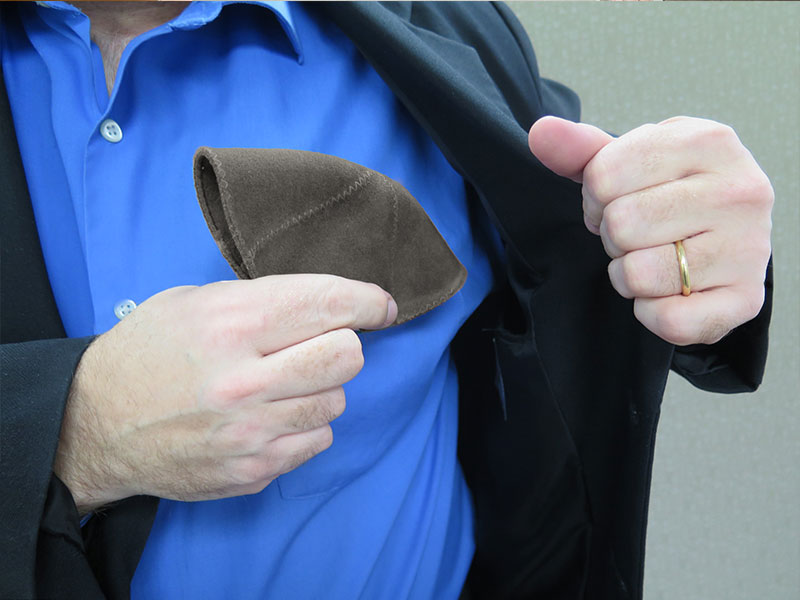A Quebec bill prohibiting the wearing of religious symbols by public servants was denounced by Jewish groups after it was tabled by the Coalition Avenir Québec (CAQ) government on March 28.
“We are deeply opposed to the restriction and erosion of the freedom of religion of individuals in the name of secularism,” said Rabbi Reuben Poupko, Quebec co-chair of the Centre for Israel and Jewish Affairs (CIJA).
“While there is strong sentiment to reaffirm the secularism of Quebec, our community believes that the secularism of the state is an institutional duty and not a personal one. The commitment to secularism does not rest on the outward appearance of individuals.”
CIJA said it also strongly opposes the invoking of the notwithstanding clause of the Canadian Charter of Rights and Freedoms contained in Bill 21, officially known as An Act Respecting the Laicity of the State.
“Any legislation that aims to restrict individual freedoms must pass the test of its constitutionality,” he said.
CIJA said it would voice its concerns at any public hearing on the bill, which has now gone to committee for study.
Harvey Levine, regional director of B’nai Brith Canada, said, “We believe it is a threat to the religious freedoms of Jews, Muslims, Sikhs and all visible religious groups in this province.”
D’Arcy McGee Liberal MNA David Birnbaum had similar criticism.
“The rights of every Quebecer can never be compromised. The fundamental equality of every Quebecer is equally sacred,” he said. “This brutal CAQ bill flies in the face of both of these absolutely fundamental principles. That is why I and our Liberal party opposition will fight it at each and every step.”
READ: BUSINESSMAN MITCH GARBER WARNS AGAINST RELIGIOUS SYMBOLS BAN IN QUEBEC
The proposed legislation, which was promised by the CAQ during the campaign leading up to the Oct. 1 election, and whose basic outlines have been made known since then, was unanimously and “vigorously” opposed by the city council of Côte St-Luc.
The resolution, moved by Coun. Dida Berku, who is a lawyer, characterizes the planned law as unconstitutional because it infringes on rights protected under both the Canadian charter and the Quebec Charter of Human Rights and Freedoms “in a way that is not reasonable in a free and democratic society.”
The council stated that dress that expresses a religious belief has no impact on a person’s “ability to provide either unbiased opinions or services in a secular state.”
While this municipality does not appear to be directly affected by the bill, Côte St-Luc would “never terminate or punish any employee of [that city] for wearing clothing required by their religion, irrespective of any adoption of any legislation to the contrary,” and would “use all legal means to contest” being forced to do otherwise.
On the day before the bill was introduced, the English Montreal School Board (EMSB) was also defiant, passing a resolution declaring it would not abide by any law that bans its teachers or other employees from wearing religious symbols.
Under the proposed legislation, the public servants who cannot wear religious symbols on the job include police officers, prison guards, judges, Crown prosecutors, court security guards, teachers and principals in public elementary and high schools, park wardens and any public employees who carry a firearm.
A “grandfather” clause exempts teachers already working from the ban.
The bill also requires people to remove face coverings for identification or security in order to receive a public service. That echoes the previous Liberal government’s state religious neutrality legislation, Bill 62, passed in October 2017. However, the sections dealing with face covering were suspended last year pending a legal challenge on their constitutionality.
The current bill invokes the notwithstanding clause to deter having to defend the law in court. After a period of five years, the clause expires if not renewed.
The bill’s preamble states it was drafted with four principles in mind: “the separation of state and religions, the religious neutrality of the state, the equality of all citizens, and freedom of conscience and freedom of religion.”
It claims to have struck a balance between “the collective rights of the Quebec nation and human rights and freedoms.”
Polls indicated a clear majority, as high as 75 per cent, of Quebecers supported such legislation.
On the same day as the bill was introduced, the government passed a motion to remove the crucifix, which has hung over the speaker’s chair in the National Assembly since 1936, removed. The CAQ had resisted doing so despite criticism that it was hypocritical to retain such a Catholic symbol while making state secularism a vaunted goal.
Montreal recently announced it would take down the crucifix over its council speaker’s chair after extensive renovations to city hall are completed.
On the day before the bill was tabled, Education Minister Jean-François Roberge introduced new regulations regarding homeschooling that clearly have the many Hasidic children who are taught by their parents in its sights.
The new rules, which go into effect on July 1, contain stricter guidelines on what must be taught at home. These include minimal requirements in French, English, mathematics, science and technology, among other subjects, and success in exams.
The regulations add to those contained in Bill 144 introduced in 2017 by the Liberals, which strengthened the government’s powers to enforce compulsory attendance at a recognized school or homeschooling program by all children between the ages of 6 and 16.
This is the third year that Hasidic and other haredi children have been homeschooled in the province’s mandatory curriculum while attending religious schools during the day. They are monitored by a public school board.
Last year, there were more than a thousand such children, the great majority supervised by the EMSB and the rest the Sir Wilfrid Laurier School Board, which is mainly concerned with the Tash community in Boisbriand, north of Montreal.
